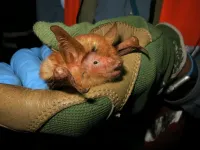(Press-News.org) COLUMBUS, Ohio - While we wait for our turn to get vaccinated against SARS-CoV-2, we could - and probably should - use the time to make sure we bring our healthiest emotional and physical selves to the treatment, a new review of previous research suggests.
Ohio State University researchers reviewed 49 vaccine studies in humans dating back 30 years that document how stress, depression and poor health behaviors can negatively affect the body's immune response to vaccination, and how improving health factors can enhance that response.
The impaired immune responses tended to fall into three categories - interference with the development of antibodies against the pathogen, more rapid erosion of antibody protection that does develop, or intensification of vaccination's side effects.
The steady stress of navigating our disrupted routines and social lives during the pandemic may have set us back when it comes to maintaining healthy behaviors, the researchers say. They report on recent data from across the world documenting higher depressive and anxiety symptoms and more insomnia during lockdown, increased alcohol sales and overeating, and fewer average step counts recorded by Fitbits.
There is good news: The power to make improvements that give us the best chance for a healthy response to the coronavirus vaccine is almost completely in our control. Managing stress through exercise and mindfulness meditation, getting enough sleep, quitting or curbing tobacco use and improving our diets - even in the short term, right around the time of vaccination - could influence how our bodies respond, the evidence suggests. And for those struggling with depression, now would be a good time to seek professional help.
"When we think of vaccine efficacy, we often think of the vaccine itself. My motivation was to draw attention to the fact that we bring important factors to the table as well - and those factors are modifiable," said Annelise Madison, first author of the paper and a graduate student in clinical psychology at Ohio State.
"If we can address them now, when most of the world has yet to receive the vaccine, we have the chance to make our response to the vaccine quicker, more robust and lasting."
A number of the studies reviewed were led by senior author Janice Kiecolt-Glaser, director of Ohio State's Institute for Behavioral Medicine Research and a professor of psychiatry and psychology in the College of Medicine. Kiecolt-Glaser and her late husband, immunologist Ronald Glaser, were pioneers in mind-body research that showed how stress impairs physical health in a variety of ways, primarily by hampering the human immune response.
The review is accepted for publication in the journal Perspectives on Psychological Science.
The studies in this review investigated the effects of psychological factors and behaviors on the immune response to a range of vaccine types, such as influenza, hepatitis B, typhoid and pneumonia. Because many findings have been consistent across responses to different vaccines, the team considered them likely to be relevant to the SARS-CoV-2 vaccine.
Kiecolt-Glaser pointed to a few of her past studies that illustrate the varying effects of different types of stress on human responses to vaccination.
In a study of medical students' immune response to a highly effective hepatitis B vaccine, all students eventually developed antibodies - but the students who were more stressed or anxious about exams coinciding with the inoculations took significantly longer to develop protective antibodies.
Research on older adults' response to a pneumococcal pneumonia vaccine showed that though all study participants initially developed antibodies quickly, the antibody response diminished over the next three to six months in those who were chronically stressed caregivers looking after spouses with dementia.
"These findings suggest that with the COVID-19 vaccine, when people are more stressed and more anxious, it may take a little longer to develop antibodies, so they should probably allow a little more time before they assume they're protected," Kiecolt-Glaser said. "Another possibility is that stress may erode protection more rapidly."
Her lab's past research has also shown that older adults - who are considered at higher risk for severe COVID-19 symptoms - sometimes don't respond well to flu vaccines. In one study, only 20% of stressed adults who were age 71 or older developed antibodies after a flu shot.
Additional studies in her lab showed that people who were depressed experienced post-vaccination side effects of lethargy, malaise and irritability for a longer period of time than people who were not depressed.
Side effects are normal - the vaccination is training the immune system to recognize a pathogen by initiating an inflammatory response that can make us feel sick - but they can cause some people to avoid vaccines.
"Side effects are from an inflammatory response to the vaccine, which is a good thing," Kiecolt-Glaser said. "You want to see a strong response to the vaccine. That's one reason we know the vaccine is effective. On the other hand, the absence of a response doesn't mean it's not effective."
According to previous research, a range of interventions may help us all get the most out of the COVID-19 vaccine: Massage and expressive writing for stress management, short- and long-term physical activity including 25 minutes of arm exercises before injection, and nutritional supplementation all helped increase antibody response or reduce side effects in past studies.
"And when you know you're going to get the vaccine the next day, try to get a good night's sleep. Just one night, and going in fully rested, can be helpful," Kiecolt-Glaser said.
Though we may be suffering from health-advice fatigue 10 months after the first lockdown, Madison said now may be the most important time to heed the experts' recommendations.
"I know it can be difficult day in and day out during the pandemic to keep prioritizing things we know we should do," she said. "But we could use this time as a wake-up call. These are important health behaviors to keep engaging in, especially as we're preparing to get vaccinated - which is a really good thing."
INFORMATION:
Research reviewed in the paper was supported by grants from the National Institutes of Health. Additional co-authors were Rosie Shrout and Megan Renna of the Institute for Behavioral Medicine Research.
Contacts:
Janice Kiecolt-Glaser,
Janice.Kiecolt-Glaser@osumc.edu
Annelise Madison,
Annelise.Madison@osumc.edu
Written by Emily Caldwell,
Caldwell.151@osu.edu
Skoltech researchers have found a way to use chemical sensors and computer vision to determine when grilled chicken is cooked just right. These tools can help restaurants monitor and automate cooking processes in their kitchens, and perhaps one day even end up in your 'smart' oven. The paper detailing this research results, supported by a Russian Science Foundation grant, was published in the journal Food Chemistry.
How do you tell that chicken breast on your grill is ready for your plate? You probably look at it closely and smell it to make sure it is done the way you like it. However, if you are a restaurant chef or head cook at a huge industrial ...
Scientists tame photon-magnon interaction.
Working with theorists in the University of Chicago's Pritzker School of Molecular Engineering, researchers in the U.S. Department of Energy's (DOE) Argonne National Laboratory have achieved a scientific control that is a first of its kind. They demonstrated a novel approach that allows real-time control of the interactions between microwave photons and magnons, potentially leading to advances in electronic devices and quantum signal processing.
Microwave photons are elementary particles forming the electromagnetic waves that we use for wireless communications. On the other hand, magnons are the elementary particles forming what scientists call "spin waves" -- wave-like disturbances in ...
In a study in mice and human cells, Johns Hopkins Medicine researchers say that they have developed a tiny, yet effective method for preventing premature birth. The vaginally-delivered treatment contains nanosized (billionth of a meter) particles of drugs that easily penetrate the vaginal wall to reach the uterine muscles and prevent them from contracting. If proven effective in humans, the treatment could be one of the only clinical options available to prevent preterm labor. The FDA has recommended removing Makena (17-hydroxyprogesterone caproate), the only approved medicine for this purpose, from the market.
The study was published Jan. 13 in Science Translational Medicine.
There ...
A group of scientists led by the American Museum of Natural History and Bat Conservation International have discovered a new species of a striking orange and black bat in a mountain range in West Africa. The species, which the researchers expect is likely critically endangered, underscores the importance of sub-Saharan "sky islands" to bat diversity. The species is described today in the journal American Museum Novitates.
"In an age of extinction, a discovery like this offers a glimmer of hope," said Winifred Frick, chief scientist at Bat Conservation International and ...
With the impact of climate change increasing by the day, scientists are studying the ways in which human behavior contributes to the damage. A recent study at Walla Walla University, by a collaboration of researchers from Walla Walla University and La Sierra University, examined the effects of acidic water on octopuses, potentially bringing new insight into both how our activities impact the world around us, and the way that world is adapting in response.
The study, "Impact of Short- and Long-Term Exposure to Elevated Seawater PCO2 on Metabolic Rate ...
The human organism requires a variety of small molecules, such as sugars or fats, in order to function properly. The composition of these so-called metabolites and their interaction - the metabolism - varies from person to person and is dependent not only on external influences, such as nutrition, but also to a significant extent on natural variations in our genetic make-up. In an international study, scientists from the Berlin Institute of Health (BIH) and Charité - Universitätsmedizin Berlin joined forces with colleagues from the United Kingdom, Australia and the United States and discovered hundreds ...
A new study from UBC researchers suggests a strong correlation between following the MIND and Mediterranean diets and later onset of Parkinson's disease (PD). While researchers have long known of neuroprotective effects of the MIND diet for diseases like Alzheimer's and dementia, this study is the first to suggest a link between this diet and brain health for Parkinson's disease (PD).
The MIND diet combines aspects of two very popular diets, the Mediterranean diet and the Dietary Approaches to Stop Hypertension (DASH) diet.
"The study shows individuals with Parkinson's disease have a significantly later age of onset if their eating pattern closely aligns with the Mediterranean-type diet. The difference shown in the study was up to 17 years later in women and eight years later ...
There are things in life that can be predicted reasonably well. The tides rise and fall. The moon waxes and wanes. A billiard ball bounces around a table according to orderly geometry.
And then there are things that defy easy prediction: The hurricane that changes direction without warning. The splashing of water in a fountain. The graceful disorder of branches growing from a tree.
These phenomena and others like them can be described as chaotic systems, and are notable for exhibiting behavior that is predictable at first, but grows increasingly random with time.
Because of the large role that chaotic systems play in the world around us, scientists and mathematicians have long sought to better understand them. Now, Caltech's Lihong Wang, the Bren Professor in the Andrew and ...
CORVALLIS, Ore. -- A recent study from Oregon State University found that after Oregon expanded Medicaid in 2014, more women were able to receive insurance coverage for abortion services, rather than paying out of pocket.
In analyzing Medicaid claims data and other medical records, researchers found that the Medicaid-financed share of total abortions increased each of the first three years following the state's Medicaid expansion. The incidence of Medicaid-financed abortions increased 18% in 2014, then 7% each in 2015 and 2016.
The total number of abortions in the state did not rise; rather, the expansion shifted who paid for them.
"According to the literature, there was a 1% decline in the abortion rate in Oregon between 2014 and 2017. During the pre-expansion ...
As marijuana outlets open after the drug is legalized, the density of those recreational retailers is associated with more use and a greater intensity of use among young adults, according to a new RAND Corporation study.
The study is among the first to examine associations between the density of marijuana outlets and marijuana use over time, and is the first to include unlicensed dispensaries in such an analysis.
Studying young adults in Los Angeles County the year before and the year after marijuana was available for recreational purchase in ...



